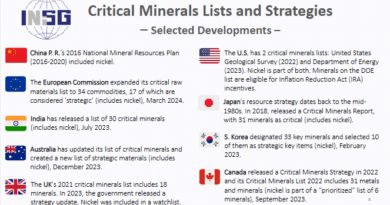Critical Minerals Institute Identifies 18 Essential Minerals for Western Economies
The Critical Minerals Institute (CMI) has released a “Hit List” of 18 minerals deemed essential for sustaining Western economic growth. This list, compiled through the monitoring of 10 international lists tracking 51 critical minerals, highlights materials vital to modern industries and technologies. The CMI prioritizes 5 of these minerals due to their strategic importance and vulnerabilities in the supply chain.
The CMI maintains this list to focus on securing supply chains, addressing market volatility, and supporting industry innovation. The CMI Hit List is intended to guide the strategic development of the global critical minerals market.
The selection process for the Hit List involves tracking global lists of essential minerals. Minerals appearing on at least 7 of the 10 international lists are included. The CMI then prioritizes these minerals based on their critical role in modern industries and their supply risk due to geopolitical or market factors.
The top 5 critical minerals identified by CMI are copper, lithium, PGMs (Platinum Group Metals), rare earth elements (REEs), and uranium. These are deemed most critical due to their strategic importance in key industries.
The full CMI Hit List includes:
- Antimony
- Cobalt
- Copper
- Fluorspar
- Gallium
- Graphite
- Lithium
- Nickel
- Niobium
- Magnesium
- PGMs
- Rare Earth Elements (REEs)
- Silicon
- Tantalum
- Tellurium
- Tungsten
- Uranium
- Vanadium
Many of these critical minerals are primarily sourced from a single country. For instance, China is a major supplier of many minerals, including gallium (98%), rare earth elements (69%), antimony (48%), bismuth (80%), graphite (77%), magnesium (88%), tungsten (81%), vanadium (68%), germanium (94%), indium (66%), silicon (69%), tellurium (59%), titanium (36%) and fluorspar (65%). Other significant suppliers include the Democratic Republic of Congo (DRC) for cobalt (74%) and tantalum (41%), Australia for lithium (48%), South Africa for PGMs (49%), and Kazakhstan for uranium (45%).
The CMI’s monitoring of critical minerals is overseen by Executive Director Alastair Neill. The institute’s work aims to ensure the strategic development of the critical minerals market globally.

